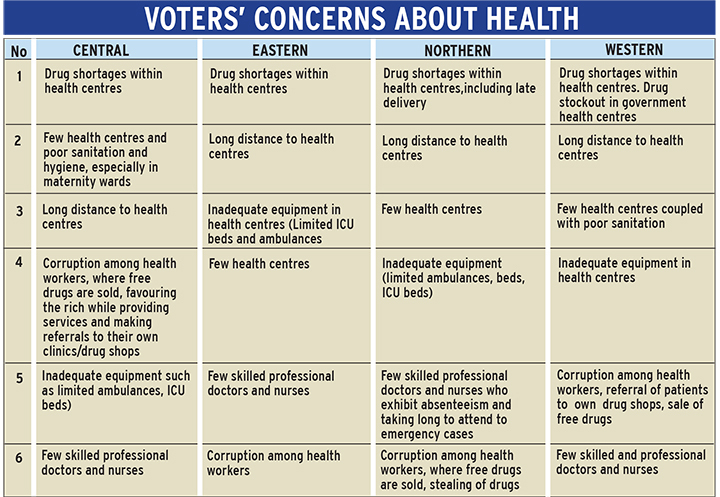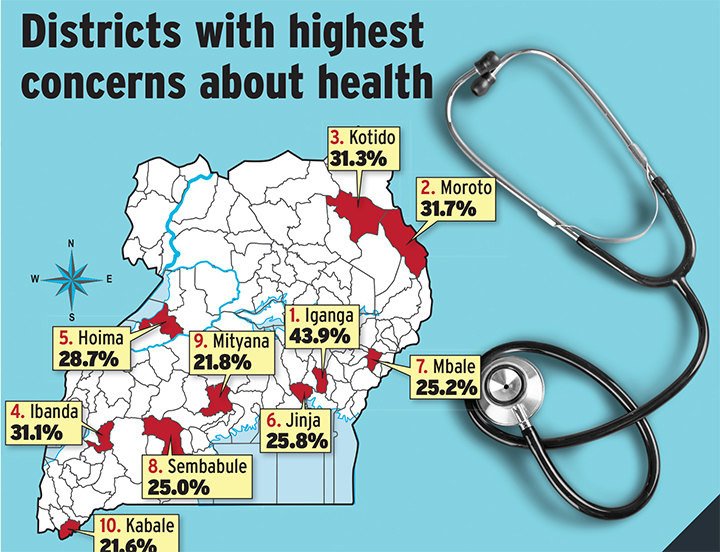Citizens' manifesto: Voters want gov't to stock essential medicines
In an opinion poll conducted by Vision Group in March, ahead of next year’s general election, Ugandans shared 20 of their most pressing concerns. Drug shortage was among the most pressing issues.
Agnes Kamuntu, 73, is battling many old age diseases. But her biggest challenge is hypertension and diabetes.
A resident of Namuwongo Kisugu in Kampala, Kamuntu has to take medicines every day.
She always gets it from a nearby facility, Kisugu Health Centre IV, because elsewhere, it is very expensive.
However, the drugs she needs usually run out and she has to wait until the health centre restocks. Her doctors have noticed that she is not adequately adhering to treatment.
During the lockdown, Kamuntu spent six months without taking medicine because it was not available.
"Every time I went to the health centre, they advised me to buy it from private pharmacies. But I cannot afford because those pharmacies ask for a lot of money. My only option is to wait until the medicine is available," she says.
Without adherence to the treatment dosage, Kamuntu's health is at stake.
In fact, doctors say intermittent dosage is worse than taking no medicine at all because not only does it fail to stabilise the body, it also creates body resistance.
Kamuntu is not alone. Many people have to break treatment due to drugstockouts. Many more are left at the mercy of drugshops run by businessmen and inferior options of the prescriptions.
According to the revised National Household Survey Report published by the Uganda Bureau of Statistics in February 2018, the proportion of people living in poverty now stands at eight million.
Most of these 21.4% of Ugandans are dying from treatable diseases, such as malaria because they cannot afford medical treatment.
The promised free drugs at Government hospitals are rarely available. Some resort to non-proven herbal alternatives till their conditions get complicated.
Pressing need
No wonder, the findings of the Vision Group poll, conducted in March this year, cited health-related issues as the most pressing needs that Ugandans want their leaders to address.
Vision Group conducted a survey in 45 districts countrywide, asking respondents what their top five concerns as voters were.

Health improvement was a consistent plea, topping all the other concerns and scoring 10.17%. Within health, drug shortage was high on the list of concerns that voters want leaders to address.
Loss of lives
Failure to get access to adequate medicines has often led to loss of lives, especially in rural areas, where drugs cannot be easily be got from private clinics and pharmacies.
When the number of deaths at the Uganda Cancer Institute rose from 1,019 in 2010 to 1,512 in 2014, the audit attributed this to lack of timely and adequate provision of drugs to the patients.
According to the executive director of the Uganda Health Care Federation (UHCF), Grace Kiwanuka, a healthy population is an asset and a country that does not invest in the health of its people loses a lot in human resource morbidity and mortality.
"Health remains at the centre of everything. Look at agriculture, for example, without a healthy workforce, you cannot plant your food, harvest and bring it to the market," Kiwanuka says.
A report on access to medicines in Uganda by Hazel Bradley and Richard Laing (2015), says 33% of people suffering from non-communicable diseases (cancer, heart problems, diabetes among others) rely on medicines outside the Government health system.
This implies that those who cannot afford will either opt for cheaper medication, which is counterfeit and ineffective, causing disease resistance.
Alternatively, they continue to struggle with the illnesses, hope for a miracle or die due to medicine stockouts yet access to medication is a fundamental right.
The report blames the heavyweight burden of disease in Uganda on lack of access to medicines, especially essential drugs.
"When patients are unable to get the affordable care needed from the Government sector, they turn to the private sector, which charges them exorbitant prices," the report stated.
Promises
In 2015, the Government promised in its manifesto to focus on efficiency and effectiveness in delivery of health services.
The focus was to include investments in availability of drugs at health facilities.

The Government also promised to consolidate immunisation and increase the HIV/AIDS awareness campaign and access to ARVs. Other pledges included efforts to eradicate malaria, intensify the fight against non-communicable diseases, such as cancer and diabetes and reducing maternal and infant mortality rates.
Performance
There has been some achievements and failures. The programme manager of the Uganda National Expanded Programme on Immunization (UNEPI) at the health ministry, Dr Alfred Driwale, applauded the Government on the immunisation front.
Following last year's (October 2019) national rollout of the measles-rubella vaccine, there have not been cases of measles and rubella reported over the last six months.
"In the past, there the wards for measles, polio and tetanus were always full, these days you hardly find a case there," Driwale notes.
In July 2019, the Government, under the health ministry, established a fully-fledged Non-Communicable Disease (NCDs) department.
According to the programme managing officer at the health ministry, Dr Frank Mugabe, the department is responsible for coordinating all efforts towards prevention and control of NCDs.
One of the strategies the department has championed is physical activity, which was launched on July 2, 2018 by the President.
However, drug shortage remains a predominant concern across all regions as captured in the Vision Group poll.
Challenges
The health ministry permanent secretary, Dr Diana Atwiine, acknowledges the drug shortage problem, but says insufficient funding is the major cause of constant drug shortage across health facilities.
"We have no capacity to increase resources. We budget and present our needs, then try to fit within the resources we are given. The work is executed based on the resources provided," she notes.
Emmanuel Ainebyoona, the health ministry spokesperson, says the ministry generates and submits a budget. But it is the finance ministry and Parliament that allocate the funds.
Funding gaps
Rashid Simuya, a medical officer at Kibuuku Health Centre IV in Kibuuku district, attributes the shortage of drugs at the facility to inadequate funding.
"We are given only sh6m to buy drugs for two months, but they last for only two weeks," he notes.
Drug shortage is not only affecting smaller facilities. Mbale Hospital director Dr Emmanuel Ituuza said he needs sh3.5b a year for drugs, but only gets sh1.5b.
Similarly, officials at Masaka Hospital need twice what they get currently. Dr Nathan Onyati, the hospital director, says sh1.2b allocated to the hospital annually is not enough for the two million population it serves.
"The National Medical Stores (NMS) delivers drugs after two months, but the stock lasts only three weeks. At times we do not get some supplies due to increase in prices," he notes.
NMS chief executive officer Moses Kamabare acknowledges the funding gaps.
"We get sh300b, instead of the required sh1 trillion to deliver essential drugs to health facilities. So, we are forced to rely on support from donors, who provide 70% of the drugs required across the country," Kamabare says.
Health budget
The health sector budget has been reducing over the last years, contrary to the Abuja Declaration.
In April 2001, African Union countries, Uganda inclusive, met and pledged to set a target of allocating at least 15% of their annual budgets to the health sector.
For instance, in the financial year 2019/2020, only sh2,589.5 trillion was allocated to the health sector.
This is 7.9% of the annual budget. The executive director of the Uganda National Health Consumers Association, Robinah Keitiritimba, says there is no other solution other than increasing the budget for health.
"We need a priority budget for health. A budget that goes beyond the health ministry figures and provides for interventions that work for people," she said.